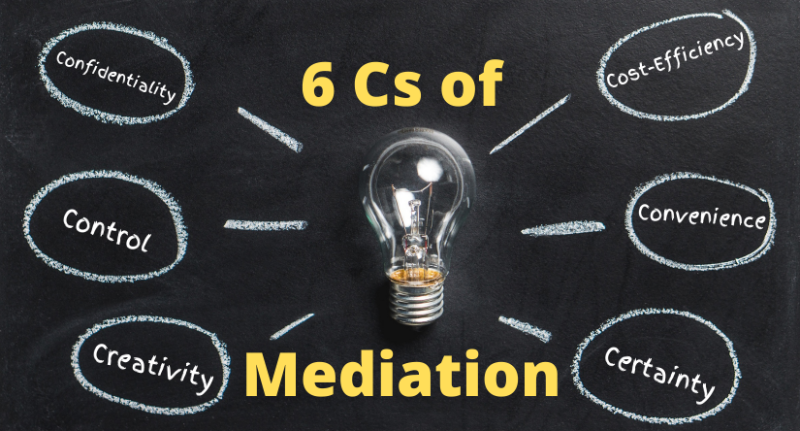
The 6-Cs of Mediation
Earlier this year, commenting on the impact COVID-19 has had on Texas’ judicial system, Texas Supreme Court Chief Justice Nathan Hecht “estimated that it will take three years to plow through the backlog of criminal cases, and that doesn’t include civil and child protection cases that have slowed as well.” In short, it’s been suggested that litigants should be ready to wait for a trial setting.
Given the time value of money, the financial and emotional costs of discovery, depositions, motion practice and hearings, trial at some point in the future, and the risk of appeal from the jury verdict, parties should prepare to be patient while a lawsuit works it way through the court-system.
While courts are working diligently to move cases along and render justice as expeditiously as possible, for those cases that are resolved without a trial, many of them find finality and peace through mediated negotiations.
Some of the reasons parties find mediation to be effective are summed up below in the “6 Cs”:
(1) Confidentiality. The Texas Legislature passed the Texas Alternative Dispute Resolution Act which says it is the policy of the state to encourage the peaceable resolution of disputes and the early settlement of litigation through voluntary settlement procedures, like mediation. Tex. Civ. Prac. & Rem. Code §154.002.
As part of this Act, the Legislature established broad confidentiality standards, subject to a few exceptions. What this means is that mediated negotiations are generally deemed to be confidential, and not something to be discussed publicly, including an open courtroom.
(2) Control. Control is an easy benefit to understand and often manifests in a couple of ways: (a) timing and (b) terms for resolution.
Timing first. The importance of timing was alluded to in the opening paragraph, but it should be noted that, even before COVID, it was not uncommon for it to take a year to a year-and-a-half for a case to reach its first trial setting on a court’s docket. The additional, COVID-induced backlog that courts are facing simply enhances the benefit to parties who want to retain control over when their disputes are resolved.
Another way parties take control over timing happens when they mediate before a lawsuit is filed. While some courts require mediation before trial, the parties – again with the guidance of their counsel – can agree to mediate at any time, even before a lawsuit is filed.
Next, terms for settlement. On what terms a mediated dispute might be resolved is determined solely by what the parties are willing to agree to. Neither the mediator, the court, nor the lawyers are decisionmakers during a mediation. What this means is that the decision whether to settle and on what terms is completely under the control of the parties.
(3) Creativity. Creativity is a concept that may best be understood by comparison to what happens in the courtroom. In a courtroom, judges are to fairly and objectively apply the law to the facts, including whatever remedies are allowed under the law and in equity. Generally, those remedies include money damages, declarations of right, and injunctive relief.
While these remedies are reasons why lawsuits get filed, sometimes there are other things the parties deem valuable to a resolution.
In mediation, the parties are able to brainstorm, explore, discuss, and consider all of those options, if any exist. So, for example, an apology, a payment plan, or any other thing the parties may deem suitable can be offered during a mediated negotiation, in addition to money.
In other words, the options available to parties in a mediated negotiation are limited only by the parties’ creativity and willingness to agree to a compromise.

(4) Cost-efficiency. No one can legitimately deny that lawsuits and lawyers can be expensive. Or, that the more time it takes to resolve a dispute, generally the more expensive it can be both in terms of time and money, not to mention lost opportunity costs.
So, while this may seem like an extension of the Control benefit, it is worth mentioning separately because the cost of litigation can be a significant decision-point in a mediated negotiation, and thus often worth considering independently as part of an overall dispute resolution strategy.
(5) Convenience: Prior to COVID, most mediations were conducted in-person, but today most are conducted online. Applications like Zoom (and others being developed and introduced) – which allow for breakout rooms, the exchange of information onscreen, and confidentiality – are some of the reasons online dispute resolution (“ODR”) is proving to be successful. Other reasons include the fact that ODR eliminates the need for parties, insurance agents, executives, lawyers, and the like to travel making it easier to fit online mediations into busy schedules.
(6) Certainty. To appreciate why certainty can be a valuable feature of a mediated resolution, one should also appreciate that trials do not always bring an end to disputes.
After trial, one or more of the parties may decide to appeal the trial court’s judgment, which can delay the end of the conflict, add more cost in both time and money, and present a situation in which the appellate court’s decision may be different from the decision the trial court reached.
Through mediated negotiations, parties explore reasons and options to agree to end the dispute instead of proceeding to trial and, thus, rendering an appeal unnecessary.
Related Post: Dispute Resolution Strategies: Litigation & Mediation
Felicia Harris Hoss
is an attorney-mediator, arbitrator, and early dispute resolution (EDR) neutral, with more than 20 years of legal experience. Through the years, Felicia has helped parties resolve disputes both inside and outside of the courtroom in a wide range of industries involving a broad spectrum of claims. Felicia is available to assist parties and their counsel through online, hybrid, and in-person mediations, arbitrations, and EDR processes.




